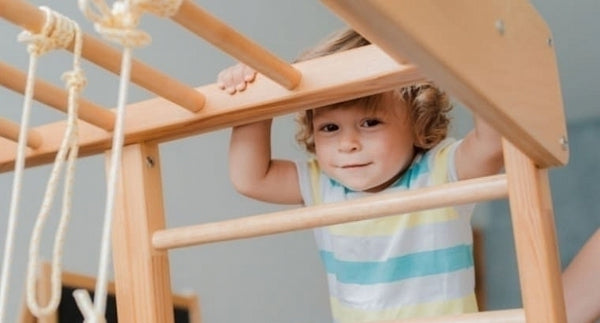Exercise and training equipment for children aged 3 and over – promoting coordination, strength and body control

Movement, coordination and strength development with RINAGYM training solutions
A child's early years are crucial for physical development. A targeted, physically active environment contributes significantly to improving coordination, body control, muscle development, and concentration. RINAGYM offers functional and safe indoor training solutions that promote movement, body awareness, and fitness in an age-appropriate way.
Individual training at home
RINAGYM training equipment – such as climbing walls , wall bars, climbing nets, and monkey bars – is designed for home use and enables regular physical activity in a safe environment. This equipment specifically promotes strength, flexibility, and body stability. Children can independently explore and improve movement patterns under adult supervision.
Their use supports muscle building, promotes endurance and coordination, and helps develop healthy body awareness. All systems meet the requirements of the EN 913:2018+A1:2021 standard for stationary gymnastics equipment.

Training with accessories
To extend the training, Rinagym also offers complementary accessories such as climbing ropes, handrails, ladders, and height-adjustable elements. These components enable varied exercise sessions, improve grip strength, promote targeted core muscle training, and enable dynamic full-body training – all under supervision.
The accessories are made of robust natural materials and designed for a long service life and safe use.
Physical activation in everyday life
Regular use of climbing and exercise elements in the home environment can help prevent a lack of exercise. Indoor structures from RINAGYM allow you to strengthen motor skills, especially balance, reaction time, and body stability. Regular physical challenges also boost self-confidence.
Promoting coordination and self-awareness
Through controlled use of the equipment at different heights and angles, children learn, under supervision, to plan and safely execute their movements. This not only supports physical control but also visual orientation and strategic spatial thinking.

Training in a social environment
RINAGYM training equipment is also suitable for structured exercise sessions in supervised groups. Under the guidance of parents or professional staff, coordinated exercise programs can be carried out that specifically promote strength, control, and teamwork.
Safety notice
Not suitable for children under 3 years of age. Use only under constant adult supervision. All devices have been tested and manufactured in accordance with the requirements of EN 913. The recommended installation height and maximum load can be found in the product specifications.
Conclusion
RINAGYM gymnastics and training solutions offer a safe, robust, and functional way to actively support the physical development of children ages 3 and up. Through targeted use of the equipment in a home or institutional setting, strength, coordination, flexibility, and body awareness can be effectively promoted – while adhering to the highest safety standards.



















